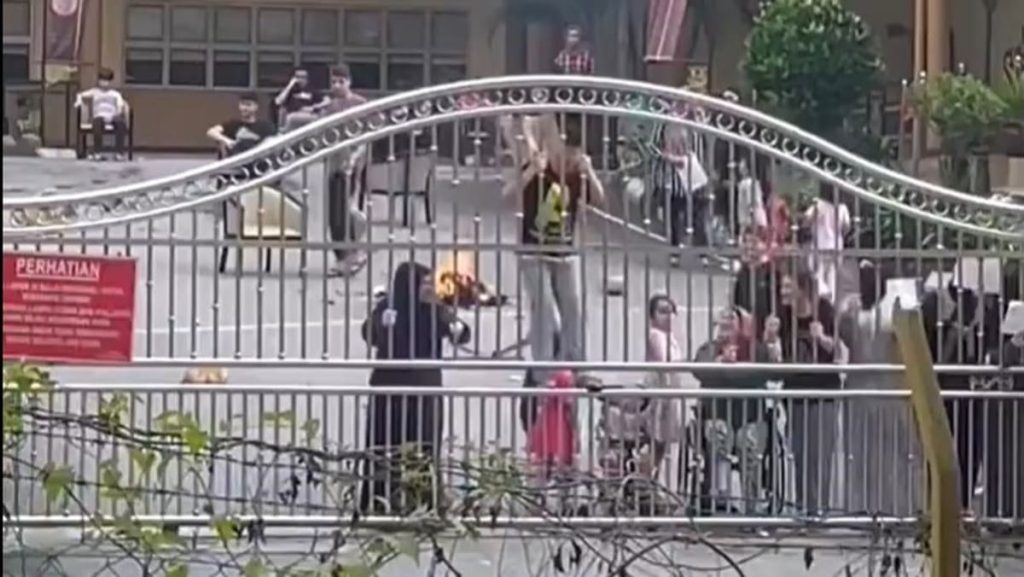The incident at Wisma Transit Kuala Lumpur on January 5, 2024, involving a group of Palestinian refugees, underscores the complex challenges inherent in providing temporary refuge for displaced populations. The incident, captured in videos circulating on social media, depicted the refugees engaging in property damage as a manifestation of their frustration and desire for a swifter return to their homeland. While the Malaysian Armed Forces successfully de-escalated the situation without any reported injuries, the event highlights the underlying tensions and anxieties experienced by the displaced Palestinians residing at the military-operated facility. Their actions, though disruptive and regrettable, reflect the deep-seated emotional strain of prolonged displacement and the yearning for a sense of normalcy and belonging.
The Palestinian refugees housed at Wisma Transit were part of a larger group brought to Malaysia in August 2023 following Israel’s military campaign in Gaza. The Malaysian government, demonstrating its commitment to humanitarian aid, provided medical care for the injured at Tuanku Mizan Armed Forces Hospital and accommodation for their relatives at the Wisma Transit facility. This act of compassion offered a temporary haven for those fleeing the conflict, but the incident in January reveals the ongoing difficulties in managing the needs and expectations of a displaced population grappling with trauma, uncertainty, and the longing for home. The incident serves as a reminder of the psychological toll of displacement and the importance of providing comprehensive support systems that address not only the physical needs but also the emotional and mental well-being of refugees.
The Palestinian Ambassador to Malaysia, Walid Abu Ali, expressed his regret over the incident, emphasizing that the actions of the protesting refugees did not reflect Palestinian ethics or culture. His statement acknowledges the unfortunate nature of the event while underscoring the broader context of the refugees’ plight. The Ambassador’s remarks, coupled with the Malaysian government’s efforts to provide assistance, highlight the collaborative approach undertaken to address the complex situation. This collaborative spirit emphasizes the shared responsibility of both the host country and the represented community in navigating the challenges of refugee resettlement and integration.
The January incident was not the first instance of unrest at Wisma Transit. In October 2023, an altercation occurred between Palestinian residents and security personnel, reportedly stemming from restrictions on movement outside the facility. This earlier incident, involving a woman distressed by the inability to contact her children in Gaza, foreshadowed the underlying anxieties and frustrations simmering within the refugee community. The October incident, like the January protest, underscores the need for open communication and culturally sensitive approaches to address the unique challenges faced by displaced populations. Restricting movement, while potentially necessary for security or logistical reasons, can exacerbate feelings of isolation and confinement, contributing to heightened tensions.
The Malaysian government’s response to the October incident, as articulated by Home Minister Saifuddin Nasution Ismail, emphasized the importance of not using the altercation as a justification for repatriating the Palestinians to their war-torn homeland. This stance reflects a commitment to upholding humanitarian principles and providing refuge to those fleeing conflict, even amidst challenging circumstances. The Minister’s statement underscores the principle that temporary setbacks or misunderstandings should not negate the fundamental right to seek asylum and protection. It reinforces Malaysia’s commitment to providing a safe haven for vulnerable populations while acknowledging the complexities inherent in managing refugee populations.
The incidents at Wisma Transit highlight the multifaceted challenges inherent in providing refuge for displaced populations. While offering shelter, medical care, and other essential services addresses immediate needs, it’s equally crucial to address the psychological impact of displacement, foster open communication, and create an environment that respects cultural sensitivities. The refugees’ desire for a swift return home is a natural human response to the trauma of displacement, and their actions, while disruptive, reflect the emotional strain of prolonged uncertainty. The Malaysian government’s ongoing efforts, in collaboration with the Palestinian embassy, demonstrate a commitment to navigating these complexities and providing comprehensive support to those seeking refuge within its borders. The situation underscores the importance of international cooperation and a holistic approach to refugee assistance, addressing not only the immediate needs but also the long-term psychological and social well-being of displaced populations.

